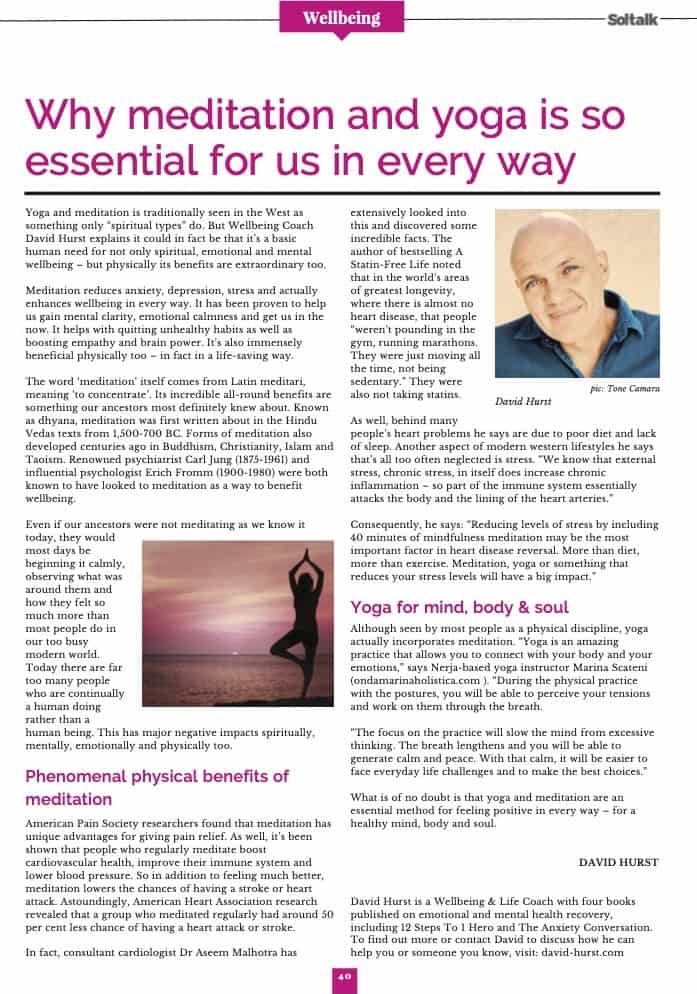Why meditation & yoga is so essential for us in every way

Yoga and meditation is traditionally seen in the West as something only “spiritual types” do. But it could in fact be that it’s a basic human need for not only spiritual, emotional and mental wellbeing – but physically its benefits are extraordinary too.
Meditation reduces anxiety, depression, stress and actually enhances wellbeing in every way. It has been proven to help us gain mental clarity, emotional calmness and get us in the now. It helps with quitting unhealthy habits as well as boosting empathy and brain power. It’s also immensely beneficial physically too – in fact in a life-saving way.
The word “meditation” itself comes from Latin meditari, meaning “to concentrate”. Its incredible all-round benefits are something our ancestors most definitely knew about. Known as dhyana, meditation was first written about in the Hindu Vedas texts from 1,500-700 BC. Forms of meditation also developed centuries ago in Buddhism, Christianity, Islam and Taoism. Renowned psychiatrist Carl Jung (1875-1961) and influential psychologist Erich Fromm (1900-1980) were both known to have looked to meditation as a way to benefit wellbeing.
Even if our ancestors were not meditating as we know it today, they would most days be beginning it calmly, observing what was around them and how they felt so much more than most people do in our too busy modern world. Today there are far too many people who are continually a human doing rather than a human being. This has major negative impacts spiritually, mentally, emotionally and physically too.
Phenomenal physical benefits of meditation
American Pain Society researchers found that meditation has unique advantages for giving pain relief. As well, it’s been shown that people who regularly meditate boost cardiovascular health, improve their immune system and lower blood pressure. So in addition to feeling much better, meditation lowers the chances of having a stroke or heart attack. Astoundingly, American Heart Association research revealed that a group who meditated regularly had around 50 per cent less chance of having a heart attack or stroke.
In fact, consultant cardiologist Dr Aseem Malhotra has extensively looked into this and discovered some incredible facts. The author of bestselling A Statin-Free Life noted that in the world’s areas of greatest longevity, where there is almost no heart disease, that people “weren’t pounding in the gym, running marathons. They were just moving all the time, not being sedentary.” They were also not taking statins.
As well, behind many people’s heart problems he says is poor diet and lack of sleep. Another aspect of modern western lifestyles he says that’s all too often neglected is stress. “We know that external stress, chronic stress, in itself does increase chronic inflammation – so part of the immune system essentially attacks the body and the lining of the heart arteries.”
Consequently, he says: “Reducing levels of stress by including 40 minutes of mindfulness meditation may be the most important factor in heart disease reversal. More than diet, more than exercise. Meditation, yoga or something that reduces your stress levels will have a big impact.”
Yoga for mind, body & soul
Although seen by most people as a physical discipline, yoga actually incorporates meditation. “Yoga is an amazing practice that allows you to connect with your body and your emotions,” says yoga instructor Marina Scateni ( ondamarinaholistica.com ).
“During the physical practice with the postures, you will be able to perceive your tensions and work on them through the breath.
“The focus on the practice will slow the mind from excessive thinking. The breath lengthens and you will be able to generate calm and peace.
With that calm, it will be easier to face everyday life challenges and to make the best choices.”
What is of no doubt is that yoga and meditation are an essential method for feeling positive in every way – for a healthy mind, body and soul.

My article for Soltalk magazine: http://www.soltalk.com/comment/october-2022/
